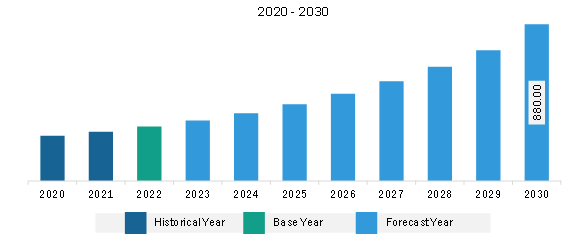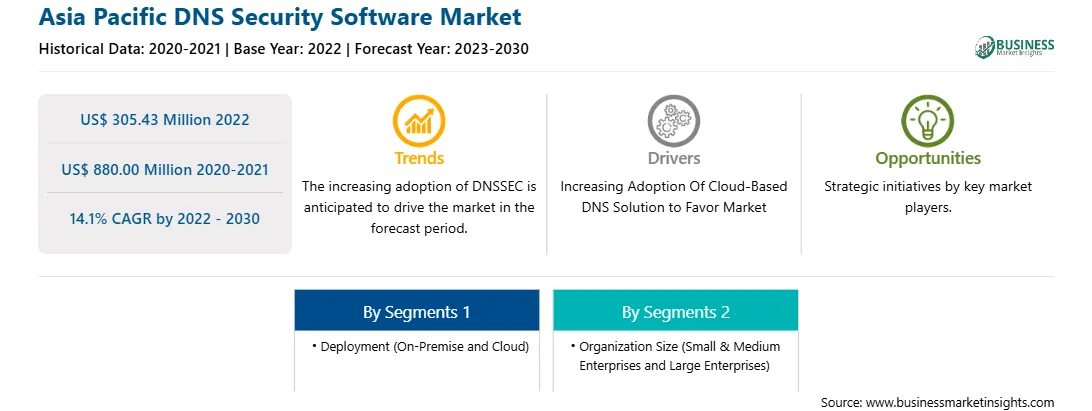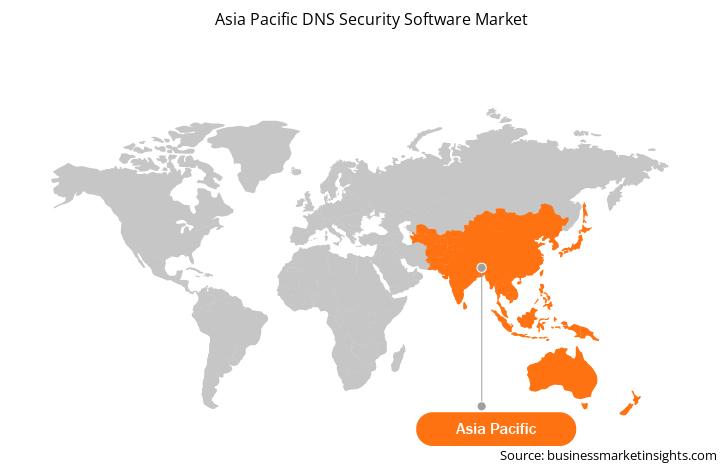The Asia Pacific DNS security software market is expected to grow from US$ 305.43 million in 2022 to US$ 880.00 million by 2030. It is estimated to grow at a CAGR of 14.1% from 2022 to 2030.
Domain name system (DNS) is essential to the reliability and performance of cloud services and internet applications. A cloud-based DNS can provide even better results than a regular DNS infrastructure. The cloud-based DNS adoption has severely disrupted the DNS landscape in a good way. Recently, there has been a drastic shift from the traditional DNS to cloud-based DNS to enhance flexibility and improve DNS performance for a better user experience. With the sudden rise in the number of business-critical applications hosted in hybrid-cloud environments, cybercriminals are increasingly targeting the cloud. Thus, various organizations are adopting cloud-based DNS solutions because of their benefits. One of the major benefits of cloud-based name resolution is that it can handle large volumes of traffic and queries without affecting the network performance. Cloud providers have global networks of DNS servers that can distribute the load and respond to requests faster than normal servers. This can benefit users through scalability, affordability, resiliency, and security, specifically by preventing distributed denial-of-service (DDoS) attacks. As businesses continue to outsource their IT infrastructure, they are adopting a cloud-based DNS to ensure an edge against business rivals. Cloud-based DNS solution providers control large-scale networks with multiple points of presence (PoP) around the world. They accelerate DNS resolution by automatically pushing queries to the closest PoP, guaranteeing consistent user experiences worldwide. Also, cloud-based DNS solution providers take a multilayered method to security, employing a variety of measures to establish trust and defend against threats. They retain dedicated security experts who closely monitor industry trends and proactively update security systems and practices to prevent malicious attacks and mitigate risks. Cloud-based DNS also exposes numerous opportunities to leverage the DNS infrastructure for global traffic steering and load balancing across hybrid environments. Cloud-based DNS aids in better visibility monitoring and makes configuration changes convenient and easy for organizations. Thus, several businesses believe cloud deployment to be the most effective and convenient deployment platform for DNS security software solutions.
The Asia Pacific DNS security software market is segmented into Australia, China, India, Japan, South Korea and the Rest of the Asia Pacific region. The increasing DNS attacks in the Asia Pacific region are helping to boost the adoption of DNS security software technologies, and the DNS security software helps to prevent the damage of the attack from the DNS attacks. Thus, the increasing DNS attacks in the Asia Pacific are helping to propel the adoption of DNS security software technologies. In June 2021, According to EfficientIP's 2021 Global DNS threat report, Malaysia had the sharpest increase in damages of 78%, with the average cost per DNS attack growing from US$ 442,820 in 2019 to US$ 787,200 in 2020. In India, the cost of DNS attacks damages on organizations grew by 32% in 2020. The companies in the Asia Pacific have suffered DNS attacks that took advantage of cloud misconfigurations, with almost 47% of organizations suffering cloud service downtime. In Asia, 54% of respondents faced in-house app downtime and 52% of cloud services downtime due to DNS attacks.
Additionally, according to NetScout Systems, Inc.'s DDoS threat intelligence report, the total number of DDoS attacks in the Asia Pacific region was 1,572,804, which is 16% higher as compared to 2022. The maximum bandwidth of the attacks is 632Gbps, and the maximum throughput is 316Mpps. Such an increase in DNS attacks is helping to propel the adoption of DNS security software technologies in the Asia Pacific region. There is an increase in DDoS attacks in China. For instance, in April 2023, StormWall s.r.o-the leading cybersecurity provider-published a report on the state of DDoS attacks for Q1 2023. The report was based on the analysis of attacks on StormWall s.r.o's client across various industries, revealing a significant increase of 47% in DDoS attacks compared to Q1 2022. China (11.7% attack share) remains the most targeted country. Additionally, in June 2023, the Chinese threat group "ChamelGang" infected Linux devices with a previously unknown implant named "ChamelDoH," allowing DNS-over-HTTPS communications with attackers' servers. The increase in DDoS attacks in China is boosting the adoption of DNS security software in China. DNS servers help distribute traffic and reduce the impact of DDoS attacks.

Strategic insights for the Asia Pacific DNS Security Software provides data-driven analysis of the industry landscape, including current trends, key players, and regional nuances. These insights offer actionable recommendations, enabling readers to differentiate themselves from competitors by identifying untapped segments or developing unique value propositions. Leveraging data analytics, these insights help industry players anticipate the market shifts, whether investors, manufacturers, or other stakeholders. A future-oriented perspective is essential, helping stakeholders anticipate market shifts and position themselves for long-term success in this dynamic region. Ultimately, effective strategic insights empower readers to make informed decisions that drive profitability and achieve their business objectives within the market.

| Report Attribute | Details |
|---|---|
| Market size in 2022 | US$ 305.43 Million |
| Market Size by 2030 | US$ 880.00 Million |
| Global CAGR (2022 - 2030) | 14.1% |
| Historical Data | 2020-2021 |
| Forecast period | 2023-2030 |
| Segments Covered |
By Deployment
|
| Regions and Countries Covered | Asia-Pacific
|
| Market leaders and key company profiles |
The geographic scope of the Asia Pacific DNS Security Software refers to the specific areas in which a business operates and competes. Understanding local distinctions, such as diverse consumer preferences (e.g., demand for specific plug types or battery backup durations), varying economic conditions, and regulatory environments, is crucial for tailoring strategies to specific markets. Businesses can expand their reach by identifying underserved areas or adapting their offerings to meet local demands. A clear market focus allows for more effective resource allocation, targeted marketing campaigns, and better positioning against local competitors, ultimately driving growth in those targeted areas.

The Asia Pacific DNS security software market is segmented into deployment, organization size, and country.
Based on deployment, the Asia Pacific DNS security software market is bifurcated into on-premise and cloud. The cloud segment held a larger share of the Asia Pacific DNS security software market in 2022.
In terms of organization size, the Asia Pacific DNS security software market is bifurcated small & medium enterprises and large enterprises. The large enterprises segment held a larger share of the Asia Pacific DNS security software market in 2022.
Based on country, the Asia Pacific DNS security software market is segmented into China, Japan, India, Australia, South Korea, and the Rest of Asia Pacific. China dominated the Asia Pacific DNS security software market in 2022.
Akamai Technologies; Comodo Security Solutions, Inc; Efficient IP; Open Text Corporation; ScoutDNS, LLC; Avast Software s.r.o.; Cisco Systems Inc; and TitanHQ are some of the leading companies operating in the Asia Pacific DNS security software market.
1. Akamai Technologies
2. Comodo Security Solutions, Inc
3. Efficient IP
4. Open Text Corporation
5. ScoutDNS, LLC
6. Avast Software s.r.o.
7. Cisco Systems Inc
8. TitanHQ
The Asia Pacific DNS Security Software Market is valued at US$ 305.43 Million in 2022, it is projected to reach US$ 880.00 Million by 2030.
As per our report Asia Pacific DNS Security Software Market, the market size is valued at US$ 305.43 Million in 2022, projecting it to reach US$ 880.00 Million by 2030. This translates to a CAGR of approximately 14.1% during the forecast period.
The Asia Pacific DNS Security Software Market report typically cover these key segments-
The historic period, base year, and forecast period can vary slightly depending on the specific market research report. However, for the Asia Pacific DNS Security Software Market report:
The Asia Pacific DNS Security Software Market is populated by several key players, each contributing to its growth and innovation. Some of the major players include:
The Asia Pacific DNS Security Software Market report is valuable for diverse stakeholders, including:
Essentially, anyone involved in or considering involvement in the Asia Pacific DNS Security Software Market value chain can benefit from the information contained in a comprehensive market report.